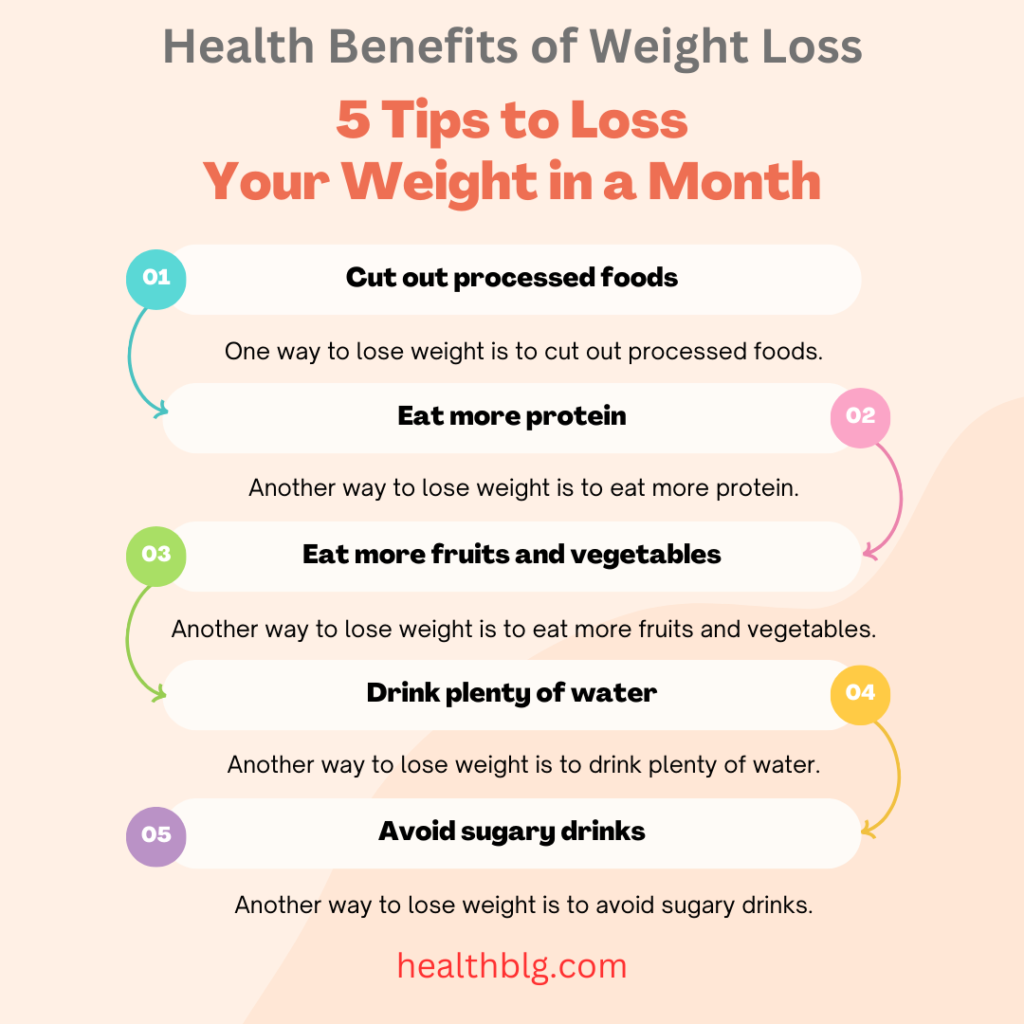The Health benefits of weight loss extend well beyond the vanity of a smaller waist, profoundly affecting physical and mental health. Although boosting appearances will get you started on a weight loss journey, the fact you decrease the risk of chronic diseases, enhance mobility, or carry mental health benefits can be even greater. Here, we will discuss the most important weight loss health benefits and how losing (and keeping off) excess pounds can have vital implications for quality of life.
Reduced Risk of Chronic Diseases
Perhaps the most important aspect of losing weight is that it changes the risk of chronic disease, including type 2 diabetes, heart disease, high blood pressure, and some cancers.
Prevention and Management of Type II Diabetes
Excess body weight contributes to insulin resistance, a predominant risk factor of type 2 diabetes. Losing only 5-10% of body weight can reduce the risk of developing diabetes by quickening insulin sensitivity and lowering blood sugar levels. In people already diagnosed with diabetes, losing weight may improve glycemic control and decrease the need for medication.
Heart Health
Excess weight places a greater load on the heart, leading to a greater risk of hypertension (high blood pressure), high cholesterol, and atherosclerosis. Losing pounds will also reduce cholesterol, relax circulation, and help blood pressure. So, these changes build a heartier heart and lessen the risk of heart attacks and strokes, resulting in a longer and more comfortable life.

Cancer Prevention
Being overweight increases the risk of radiation, such as to the breast, colon, and liver. The exact mechanisms are still being investigated, but it is believed that excess fat causes inflammation and hormonal changes, which in turn increase the risk of cancer. A healthy immune system is crucial when combating an illness, and losing weight will help lower those risk factors and maintain a healthy immune system.
Lower Joint Pain and Increased Mobility
Because of this, excess weight adds extra strain to joints, especially lower body joints (e.g., knees, hips, and ankles). In the long run, this may cause joint aches, swelling, and illnesses comparable to osteoarthritis. Decreased weight can ease pain and increase ease of movement.
Decreases Osteoarthritis Symptoms
Research reveals that losing even a small amount of weight can help ease arthritis discomfort for overweight people (less weight bears down on cartilage and creates less wear and tear). Hold on for extra mobility and the best ability to participate in physical sports, which will help you lose weight.
Enhanced Physical Activity
When we lose weight and lose being tired and weary, we have more stamina. This helps us to enjoy physical activity easily and for a longer time. When individuals feel stronger, they have a higher tendency to work out, which is a positive, healthy cycle that also helps control weight over the long term.
Better Sleep Quality
The connection between sleep disorders and extra weight: Obstructive sleep apnea (OSA) is a slow-place breathing disorder that is due to the throat muscles at the back of your throat relaxing, closing up your airways while sleeping, whereas people who have OSA will stop breathing for 10 seconds or longer. Obstructive sleep apnea (OSA) leads to lack of sleep at night, morning fatigue, and more serious health risks, including greater susceptibility to heart disease. Studies suggest that FP patients who lose weight improve sleep quality and reduce the severity of sleep apnea.
Less Snoring and Better Airway/ Breathing
Weight loss may reduce the size of fat deposits in the upper airway, thereby reducing snoring and facilitating airflow. The result is improved, deeper sleep and a lower chance of developing sleep-related health issues, leading to a much better night and greater energy and power during the day.
Increased Energy Levels
Better sleep means the body rests more, increasing alertness, concentration, and energy. Improved sleep quality has also promoted a healthy metabolism by regulating hunger hormones and making food intake easier to modulate.
Enhanced Mental Health
It improves not just self-esteem and body image but also reduces anxiety and depression symptoms, all of which are important components of mental health and well-being, making weight loss beneficial for mental health. Mental health is particularly important because it greatly impacts your ability to stay motivated and build healthy lifestyle habits.
Enhanced Self-Worth and Assurance
People will also notice the difference in how they feel about themselves when working on their weight loss. Feeling more self-absorbed can increase social participation, better social connections, and a more optimistic worldview.
Lower Levels Of Depression And Anxiety
Studies have found that losing weight can relieve depression and anxiety. This boost could be due to physiological reasons (like better sleep and hormone levels normalising) and psychological reasons (like feeling more confident and less stressed). Movement, which is usually included in a fitness plan for weight loss, also causes the release of endorphins, leading to better moods and less stress.
Better Cognitive Function
Studies show that losing weight can help with cognitive functioning while lowering the risk of cognitive decline as we age. Maintaining a proper weight may improve blood flow to your brain, which can benefit memory, concentration, and other mental functions.
Hormones balanced and improved fertility
Excess body weight can throw everything out of balance, from mood to energy to reproductive health, providing a hormone level imbalance. The right diet can help you lose some extra pounds, which can help balance hormones in patients with polycystic ovary syndrome (PCOS), reduce problems, and help with fertility.
Regulated Menstrual Cycles

Losing even a small amount of weight decreases insulin resistance in women with polycystic ovarian syndrome (PCOS) or irregular menstrual cycles. It can help regularize the menstrual cycle by restoring hormone levels to normal. This, in turn, aids reproductive health and may help conception.
Increased Levels of Testosterone in Males
Testosterone is a key male hormone that affects energy, libido, and mood, and fat can suppress this in men. Yeah, despite being a weight loss supplement, it is also capable of helping to increase testosterone levels, give more vigour, and improve human health overall.
Enhanced Immune Function
Increased weight, however, has been correlated with chronic inflammation, a process that inhibits immune competence. Reducing weight means less strain and less inflammation on the body, which could help the immune system respond better.
Reduced Chronic Inflammation
Chronic low-grade inflammation is a common consequence of obesity, making the body more vulnerable to illness and preventing it from defending against infections. Reducing inflammatory markers with weight loss helps fortify immune function and provides a greater ability to ward off colds, flu, and other common bacteria and viruses.
Improved Vaccine Efficacy
Studies indicate obesity compromises a full immune response, which could dilute the power of some vaccines. Exercising and losing weight will lead to better immune function, which means vaccinating uptake against preventable diseases which are not in practice.
Better Digestion and GI Tract Health
Losing weight may also benefit digestive health by lowering acid reflux and promoting a more favourable gut microbiome.
Reduced Acid Reflux
In particular, Abdominal fat applies force to the stomach, resulting in stomach acid streaming support into the oesophagus and causing stomach acid to reflux right into the oesophagus. These symptoms can be resolved with weight loss; especially rapid weight loss from the belly can diminish these symptoms, facilitating better digestion and greater comfort after eating.
Healthy Gut Bacteria
A healthy weight also helps regulate gut bacteria, which is useful in digestion and immune health. An ideal microbiome helps absorb nutrients, metabolize food, and prevent inflammation.
Living Longer with More Enjoyment
Losing weight can lead to a longer and better quality of life by lowering the chances of chronic diseases, aiding movement, and bolstering mental health.
Increased Life Expectancy
Research indicates that shedding excess pounds and keeping them off can increase longevity — specifically for people at risk of diseases related to obesity. And even modest weight loss appears to be connected to a lower risk of dying.

Better Quality of Life
People who reach a healthy weight frequently enjoy a higher quality of life regarding their energy level, mental health, pain level, and ability to do more things. That progress carries into everyday life, family interactions, and enjoying pastimes and company.
Frequently Asked Questions
Q. What are the benefits of losing weight?
Answer: Reducing weight has wide-ranging health benefits, including decreased risk of chronic diseases such as type 2 diabetes, heart disease, and cancer. In addition to this, losing weight may improve joint health, sleep, mental health, and immune function.
Q. How Does Losing Weight Lower Your Risk of Chronic Diseases?
Answer: Being overweight increases hypertension, high cholesterol, and insulin resistance, all of which are risk factors for heart disease and diabetes. If you do have weight to lose, reducing this, even if only modestly (5-10%), can help improve blood pressure, blood sugar, and cholesterol levels, thus decreasing your risk of disease.
Q. Does weight loss help with joint pain?
Answer: Losing weight does relieve pressure on the joints—especially the knees, hips, and lower back. This can ease pain, reduce inflammation, and control osteoarthritis, allowing you to move around and be easily active.
Q. And does losing weight enhance the quality of your sleep?
Answer: Weight loss can promote better sleep, especially among people with obstructive sleep apnea (OSA). It can help open the airway, improve normal breathing, reduce snoring, and help people sleep better by removing fat deposits around the neck and upper airway.
Q: What is the impact of mental health and weight loss?
Answer: Weight loss can also improve mental health by increasing self-esteem, lowering anxiety and depression, and increasing energy levels. Weight reduction requires a primary lifestyle change, specifically boosted exercise, which launches endorphins that enhance the room and lower anxiety.
Q. If you lose weight, will it help you become pregnant?
Answer: Yes, losing weight can enhance fertility for some people by regulating hormones, improving menstrual regularity, and lowering insulin resistance, particularly for people with polycystic ovary syndrome (PCOS). For men, losing weight can help boost testosterone, which is good for reproductive health.
Q. The links between weight loss and boosted immunityWhat is weight loss? How exactly does it boost the immune system?
Answer: Weight loss is beneficial by reducing chronic inflammation and promoting hormone regulators associated with improved immune outcomes. Maintaining a healthy weight means the immune system will work properly, and patients can better defeat diseases.
Q. Does losing weight help with digestion?
Answer: Of course, weight loss can alleviate pressure on the stomach from the abdomen, so this will help reduce symptoms of acid reflux. It will also help a more healthy gut microbiome, which is beneficial for digestive support, metabolic support, and general help.
Q. Does losing weight make you live longer?
Answer: Does losing weight add years to life, especially by preventing obesity-related diseases such as heart disease, diabetes and cancer? Research indicates that losing even a modest amount of weight reduces the risk of dying and typically results in a longer lifespan with improved quality of life.
Q. I would need to lose weight to get the health benefits.
Answer: Does that mean we should aim for massive weight loss or nothing? A: No, even modest weight loss (5-10% of body mass) will substantially improve health, reducing risk factors such as blood pressure, cholesterol, and blood sugar. It all adds up, and even small, welcome changes can significantly influence health and wellness.
While weight loss benefits include a better appearance, one additional advantage of reducing weight is that you will lead a healthier and more active lifestyle.

CONCLUSION: Transformative health benefits of weight loss
The benefits of losing weight go way beyond looks. It turns into a heart that works better and moves better, has balanced hormones, normal mental well-being, and an immune system that can withstand anything. Learning about the long-term health benefits can motivate you to live healthier as you lose weight.
Losing weight doesn’t have to be significant to make a difference. A small decrease in weight–5-10% loss from your starting weight–can have major health benefits, changing your physical and mental health status. When you do things the healthy way, weight loss provides so many benefits that you will feel it is a journey worth carrying and will have a long, healthy, and happy life.
<script type="application/ld+json">
{
"@context": "https://schema.org",
"@type": "Article",
"mainEntityOfPage": {
"@type": "WebPage",
"@id": "https://healthblg.com/health-benefits-of-weight-loss/"
},
"headline": "Health Benefits of Weight Loss: A Path to Better Health and Well-Being",
"description": "Health Benefits of Weight Loss: A Path to Better Health and Well-Being",
"image": "https://healthblg.com/wp-content/uploads/2024/11/Health-Benefits-of-Weight-Loss-2-1024x1024.png",
"author": {
"@type": "",
"name": ""
},
"publisher": {
"@type": "Organization",
"name": "",
"logo": {
"@type": "ImageObject",
"url": ""
}
},
"datePublished": ""
}
</script>









